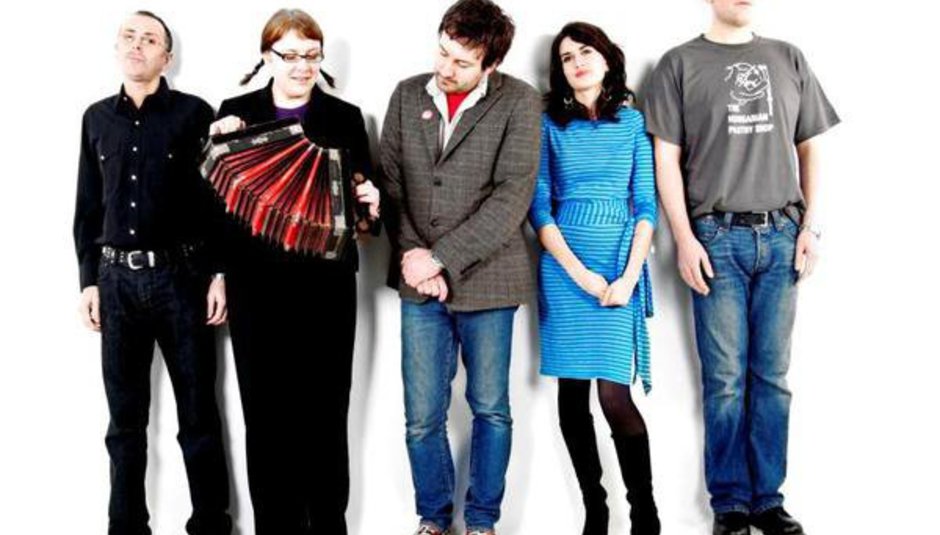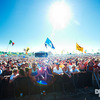Despite being active on the Glaswegian live circuit since the tail end of the 1990s whilst having recorded arguably two of the most understated albums of the following decade in 2007's Profit In Your Poetry and its successor two years later, React Or Die, Butcher Boy remain a relatively unknown quantity outside of the underground fanzine and internet blog community.
Formed initially as a vehicle for the unconditional musings of songwriter and frontman John Blain Hunt, it wasn't really until the early months of 2005 that the musical vision to accompany his poetic verse started taking shape. Since then, having amassed an almost unilateral wave of critical acclaim both as a live band and recording artists, they've somehow managed to remain a closely guarded secret.
Now, with a new record label Damaged Goods and a third album ready to go later this month in the shape of Helping Hands, DiS thought it high time that we track down the somewhat elusive Hunt for a chat about the past, present, and all being well, future. This we did at the recent Indietracks festival prior to their Saturday teatime slot on the outdoor stage...
DiS: This is your second time at Indietracks having played here previously in 2009. What do you enjoy about playing here compared to other festivals, as I believe this is your only date of this kind in 2011?
John Blain Hunt: We don't play any other festivals at all to be honest. It's a real family event, there's lots of kids about, which kind of makes for a nice atmosphere. Whenever we play gigs on our own I always try and book us into family friendly places, which can be quite difficult. We've played things like Christmas fayres, and it's really enjoyable when children are there because they seem to really enjoy the music. It's also good fun to hang about here afterwards. We never got the opportunity to do that last time but I'm going to be DJing later on and we're staying over tonight.
DiS: There's no obvious barrier here between the artists and their audience which you tend to find at many bigger festivals. It's quite unique for that in many ways.
JBH: I guess that's really quite endemic of the Indie Pop scene. It's a lot more democratic, and there are very few egos, which is obviously a good thing.
DiS: Do you think Butcher Boy's music fits in with the traditional ethos of a festival like Indietracks? On a personal level I'd say you have more in common musically with bands like The Antlers and The Phantom Band than say Talulah Gosh or The Pooh Sticks.
JBH: That's probably true, although we're not averse to the term "Indie Pop" at all. I don't think we are of that particular ilk in a musical sense but we definitely share the same attitudes as a lot of people associated with that scene. It's interesting coming to a festival like this and seeing the kind of people that come here. Even in Glasgow, you can kind of see that the whole Indie Pop scene has got smaller and smaller, which is a real shame, and it's become so specialised and to a degree, fractured. I say this because I used to run a club night up in Glasgow. I started it ten years ago which was pre-Internet in that everyone knew each other via word of mouth. I mean, the Internet was obviously around but it wasn't a focal point in people's lives back then. There was more of an open-minded attitude back then in that musically no one had to be so specific about their tastes. It was more about giving people somewhere to congregate and do whatever they wanted really, whereas now it is very purest, almost an exclusively DIY kind of mentality. There are probably a lot of bands around now that are so pure I don't even know about them at all! I do feel a bit on the outside of it in some ways, but then it was never our band's intention to be part of the Indie Pop or any other scene for that matter. I wouldn't like to be in a position where I had to rely on a scene to be able to play music.
DiS: In some ways your music has been compared to some of the more pivotal artists from the Indie Pop scene, most notably Belle & Sebastian. What do you make of such comparisons?
JBH: I really like Belle & Sebastian, there's no two ways about it. They're a really fantastic band and what they had when they started was really special. They created their own world and since then they've gone on to become really proficient songwriters and pop musicians, so to an extent it doesn't physically bother me. It should grate a little bit that we get lumped in with them - probably more to do with where we're from than how we sound - and it is rather lazy because lyrically, I know that I write about different things, and musically we're quite diverse. It's the same for them really. I know they've got guys in their band who are into very mainstream rock and roll like the Stones and we've got a similar mix, some of us like folk, Duane Eddy, punk...
DiS: That comes across in the music as you're not an easy band to pigeonhole in terms of being genre specific.
JBH: I don't think about us as being any particular type of band. When I'm writing lyrics, I tend to think about them more in the same way as poets that I like and that's what I want to convey with Butcher Boy.
DiS: Isn't that how Butcher Boy started, initially as a solo project for your poetry? How difficult was it turning that into music, particularly as a lot of the arrangements sound quite complex, especially on the new record?
JBH: That is how it started, but at the same time I was always really interested in writing music. I didn't learn to play the guitar until I was nineteen, which is relatively late, and also I was left-handed, which is kind of unusual in that sense. Initially I only wanted to write music for myself, and to this day I can't play anyone else's songs. I was writing words and I wanted to put them to music, and there's no doubt that some of my earliest songs were just...brutal! At the time I thought they were great, but then looking back I'm glad I never released any of that stuff! I've always loved poetry and pop music so in a way it made sense for the two to come together fro that perspective.
DiS: How difficult is it to recruit people into the band? I know there have been different people playing on various records and Butcher Boy has never had a settled line-up as such.
JBH: It's quite difficult to co-ordinate, which I suppose is one of the reasons we don't play live an awful lot if I'm honest. We've all got full-time jobs, we all live in different parts of Glasgow, and some of us have got families and children. They're all people who I've been friends with for a long time and we all share similar ideas and talk about similar things. We do have different influences but I guess we're close enough to be able to gravitate towards each other and operate in the same way. I think having done a couple of records before there's an element of trust in there as well, and we always try and do something a little bit different. We have an understanding that whatever we do is for the greater good of creating something.
DiS: I'd agree with that, as all three records sound very different in their own way, especially Helping Hands which has more electronic and orchestral arrangements than either of its predecessors. Is this a direction you're looking to pursue in the future?
JBH: My favourite thing about being in a band is recording. I have such great fun doing it. Basil (Pieroni) is a real guitar buff, and Alison (Eales) is unbelievably talented on the keyboards, so we can expose things like that. We spend an enormous amount of time working on our recordings. It certainly doesn't just fall together. We might try fifty different things and then on the fifty-first attempt come up with something which we all agree on. We did a soundtrack last year for a film and that gave us some idea where we wanted to go with this record. I think it was the first time where I'd felt comfortable enough to use pieces of music to convey emotion rather than words. That was something we would be watching the film frame by frame, trying to piece things together to create an emotion. It was a whole new experience to us, and definitely something we may try and develop again.
DiS: At the same time, it's interesting that you've called Helping Hands the final part of a trilogy even though none of the three records sound the same. What is it that links all three, apart from its creators obviously..?
JBH: Musically I'd say you're right, more because as musicians playing together in a band we've got better. For me, there's always a thread with the lyrics, and I often try to be quite specific with the way I tell a story. The first record specifically relates to childhood for example. I'd written sleeve notes previously which were actually quite explicit, and when I was deciding what to write for the inlay of Helping Hands it was almost as if I'd reached the end, so it made sense for that be the final part of the trilogy as it were.
DiS: A lot of your songs do tend to depict a certain time and place. The title track on the new record mentions "I keep crawling from Langside to Kerelaw, from Castlepark to Pollokshaws" while 'Parliament Hill' off the same album also seems quite specific in its references.
JBH: They are about very specific things. Sometimes I'll write from my parents perspective and how they would have viewed the world in the 1960s and how different it was back then. You know, she would have been expected to have kids by the age of nineteen...that's just the way it was. I kind of think about stuff like that all the time, so lyrically there are very strong threads throughout all our records.
DiS: You've also recently signed to Damaged Goods having released your first two records on the How Does It Feel To Be Loved? label. What persuaded you to sign with them?
JBH: Ian Watson from How Does It Feel To Be Loved? said he'd put the record out for us but he'd have difficulty in giving it a great deal of promotion, and so we'd probably have just stiffed at the same level as we did with React Or Die. Critically, that last record did well but in terms of sales it didn't sell enough copies for us to even afford to make a third album. We asked for help from Creative Scotland and dug deep into our own pockets to pay for it. Ian Ballard from Damaged Goods was very enthusiastic. I know he's done an eclectic bunch of records, many of which just aren't our type of music at all, yet strangely I kind of like that. He really likes our records and said he had some solid ideas about what he could do with this one so we thought "why not go for it?" and so far it's worked out good.
DiS: The biggest surprise on Helping Hands for me - and purely in a good way - was 'Russian Dolls', which is possibly your poppiest, most radio friendly song to date. Do you still have one eye set on cracking the mainstream?
JBH: You know, that's something I've never thought about at all. It's also quite odd you say that about 'Russian Dolls', because I find that a very difficult song to be honest. It was built out of a riff we did for the film, and the scene it accompanied was a burglary in progress. We then speeded it up and added a few strings to give it that bit more urgency, but it took a while for that one to work which is why we kept adding bits to it. I think the guitars sound a bit like John McGeoch-era Siouxsie And The Banshees, which is very different for us. We have a guy who's making a video for 'Russian Dolls' actually. I gave him a copy of the record because he was going to use one of our songs in a film and I said rather than paying us for it could you make a video instead, and he came back and asked if he could do one for 'Russian Dolls', but we went with 'Imperial' as the single so hopefully he can do us one for that as well. I mean, of course I'd be delighted if it got played on the radio but...
DiS: I know you've spoken earlier about the difficulties of co-ordinating all band members being in the same place at any one time, but will there be any kind of tour to promote Helping Hands in the foreseeable future?
JBH: We're trying to fit something together. Today is one of the few occasions where everyone in the band could make themselves available. If we could do a tour based around weekends, you know, just play twelve consecutive Saturday nights then possibly! We have got a few options where we've been offered shows in Manchester, Newcastle, Edinburgh, Glasgow and Birmingham but the difficult parts are how and when we're able to do them. I know it probably sounds like an excuse but we'd all have to synchronise time off work and some of us would have to find babysitters and...I like playing gigs, it's something I enjoy doing and I've never suffered from nerves. I think some people are under the impression that the reason we don't play live very often is because we don't enjoy it but that couldn't be further from the truth. We do, but there's eight very different people in this band who have varying priorities and we've always worked as a democracy. Everyone's keen to do it and with the new record coming out soon it's an ideal time to put together a sequence of dates. I also feel this is maybe the first time enough people are genuinely interested in the band to actually justify the time and expense of going on tour.
DiS: Really?
JBH: Yeah. I don't want to come across as a pessimist but it goes back to the first review we ever had. It was a really bad one from The Independent, and to be honest, even when we've had good reviews since I tend to take them all with a pinch of salt. We literally create music for ourselves and we're not going to do it for reasons just to satisfy third parties we've never met and probably never will.
DiS: That's interesting. Do you believe that the music press still hold enough power to make or break a band, even from a self-confidence point of view?
JBH: I don't know...maybe if I thought about it too much then perhaps. That first review was really damning, but at the same time it didn't ruin the band. I was a bit reticent to begin with but I think after three records we're in a position to say our music is solid, or decent, even if it's not our place to call it good or bad. That's for other people to decide whether it's of a particular quality or not.
DiS: Finally, I have to ask you a question about Neil Jordan's celluloid interpretation of the Patrick McCabe novel from where the band take their name. Do you think the portrayal of lead character Francie Brady was as accurate as it could have been in comparison to the original story?
JBH: I read the book when I was eighteen and I was staggered by it. The story is just so guttural you know, really really breathtaking. I enjoyed the film but it wasn't the same, particularly after having read the book first.
The album Helping Hands is out on Monday 29th August through the Damaged Goods label.






















